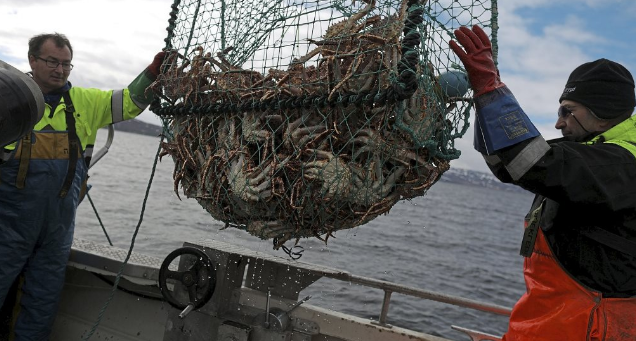
Reindeer herders and fishermen tangle with new industries as climate change and technology enable mineral extraction
When he’s not out on the Arctic tundra with his 2,000 reindeer, his dog and Whitney Houston blasting through his headphones, Nils Mathis Sara is often busy explaining to people how a planned copper mine threatens his livelihood. Along with other Sami herders and fishermen, the 60-year-old is in a standoff with the mine owners, Norwegian officials and many townspeople that is, after six years, coming to a head. It is a litmus test for the Arctic, where climate change and technology are enabling mineral and energy extraction, shipping and tourismwhile threatening traditional ways of life and creating tensions among its four million inhabitants. „This mine is completely nuts,“ said Sara, preparing to move his herd from winter pastures on Norway’s windswept Finnmarkplateau three days north to the grass-rich pastures on the coast.
lobal majors, including Eni, Equinor, Gazprom, Glencore, Lukoil and Rio Tinto, are grappling with how to square their prospecting plans with the interests of people whose views count more than in the past.
Anders Oskal, Executive Director of the International Centre for Reindeer Husbandry,said the copper mine was in the spotlight. „Big industry is sitting on the fence and seeing how it plays out,“ he said. Local officials gave the green light for the privately-owned Nussir copper project back in 2012 on the grounds it would bring in much-needed jobs and funds. It has been stuck ever since. Indigenous Sami herders and fishermen say the plan to dump the mine’s tailings in the fjord, while less damaging than piling them on land, would destroy spawning grounds for cod and the mine would damage summer pasture grounds.
Terje Wickstroem, mayor of Kvalsund, a village of painted wooden houses on the Repparfjord, said the mine would boost a municipality which spends 40 percent of its income caring for the elderly as young people move away.
Oskal, of the reindeer husbandry centre, said it was ironic that Nussir may be allowed to dump waste when Norwegian laws oblige Sami reindeer herders to send the animals’ stomachs and intestines for destruction, sometimes hundreds of kilometres away, to reduce risks of disease.
The Sami herders insist they are not opposed to change — their language has no word for „stability“ — but Sara said the politicians were not listening. „If this mine gets the go ahead, we will go to the courts to stop it,“ he said. Wickstroem said he understood Sara’s concerns. „His business is under pressure. But this is a bigger, national debate.“
GWLADYS FOUCHE, ALISTER DOYLE
Text pochází z agentury Reuters

